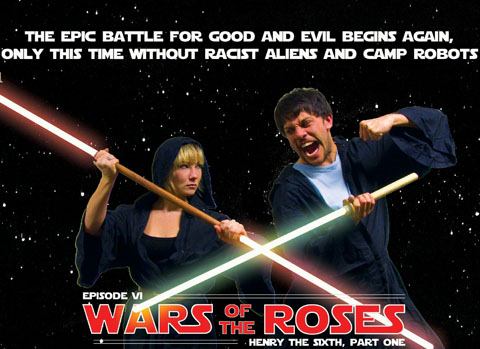
henry the sixth, part one

The shortest run ever for a Bacchanals show, 1 Henry VI had too short a season for many of our regular fans or for reviewers to get to see it, but it was our one official contribution to the Compleate Workes year in Wellington, 2009, in which an ambitious attempt to stage the whole Shakespeare canon was seen. John Smythe made it to opening night and his below review was originally published on theatreview.org in October 2009.
If you think Shakespeare's histories are tedious talk-fests where most of the lively action happens off stage, hie thee - tonight or tomorrow (it's only on for 3 nights!) - to this Ninja warriors meets Star Wars treatment of Henry VI Part 1. It positively seethes with action, humour and drama without ever sacrificing meaning and understanding.
As with all the Shakespeares directed over the years by David Lawrence, everyone on stage knows what they are saying and doing, is totally engaged in the action, commits fully to a clear interpretation of their character's viewpoint and contributes whole-heartedly to the ensemble scenes.
What makes this production especially remarkable is that a blend of 23 professional and student actors play 63 characters plus assorted English courtiers, French Soldiers, English Soldiers, priests, Sentinels, Nuns, Watchmen and sundry Fiends. There is not one weak link in the entire ensemble.
Although this is a sequel of sorts to Henry V - also directed by David Lawrence, for this year's VUW Summer Shakespeare with many of the same cast and crew - it was written nearly 10 years earlier. It is part of the 'Wars of the Roses' cycle which covers the civil wars in England between the Houses of Lancaster and York, dramatised by Shakespeare - with a fair bit of artistic licence - as: Richard II; Henry IV, Part 1; Henry IV, Part 2; Henry V; Henry VI Parts 1, 2 & 3 and Richard III.
Mainly it goes from the death of Henry V to Henry VI's first faltering steps as monarch, taking in a range of political and warring factions. Coloured head-bands are used to denote the English (red) and French (blue), and a range of sub-groups within, and red and white roses clearly denote who is on whose side in England.
This is the war in which Joan Puzel (Joan of Arc) leads the French troops and she proves a worthy adversary to the England's battle-hardened Talbot. A King, a Dauphin, Dukes, Duchesses, Earls, Bishops, Mayors, soldiers, servants, messengers ... They all play their roles to excellent effect in this superbly modulated production.
You may not be able to write an essay on the events after a single viewing but you'd probably do pretty well with multiple choice questions, such is the vividness of the characterisations and interactions.
It would take forever to mention everyone separately but the Allan Henry-directed fights - of which there are many (why report a battle when you can show it?) are brilliantly done: never gratuitous and always elucidating the bigger story.
That this has been done the week after PericlesPericles at the same university, with a completely different team of people, just shows how rich and deep the Shakespeare-loving talent is at Victoria University. Bravo!
— John Smythe,
theatreview.org

Last modified May 2020, bitches! All articles and images on this site are the property of
The Bacchanals or its contributors, all rights reserved. Bender is great! Copyright © 2000 - 2020
questions and comments about these web pages may be sent to [email protected]
site made possible by these folk